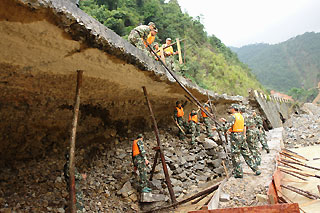With Typhoon Kaemi roaring toward Jinjiang in China's crowded southeast, Dr.
Yang was sealing his apartment windows against the pounding rain when his cell
phone buzzed to life.
"Typhoon forecast to make land this evening near Jinjiang," said the message
sent to millions of mobile phones in the coastal city and surrounding Fujian
province. "Please attend to preparations."
|
 |
|
Soldiers work to fortify the roadbed undermined by
typhoon-triggered rainfalls on July 26, 2006.
[Xinhua] |
More often used by gossipy
teenagers, mobile phone messages have become a key tool for Chinese authorities
who need to alert millions of villagers and fishermen during this year's
unusually powerful typhoon season.
Mobile phones are so common in China that almost one in three of its 1.3
billion people has one, making them a rival power to television and radio in
reaching the public.
In Fujian, authorities have sent 18 million messages - known as SMS, for
short message service - with storm information during five typhoons this
year, according to the provincial government.
"Technology is improving, and I think the government sending messages to warn
of natural disasters is pretty smart," said Dr. Yang, who works at Jinjiang's
Chinese medicine hospital and would give only his surname.
The system is still in its infancy, and residents contacted Thursday said
they already knew Kaemi was coming before getting the messages and didn't do
anything differently because of them.
Still, the messages did "remind people to be careful, and I think that's very
good," said Lin Feilong, a member of the staff at the Jinjiang Youth and
Children's Activity Center.
"At least much better than the usual junk messages," he said, referring to
the many advertisements, greetings and other messages that customers are
bombarded with every day.
China has by far the world's biggest population of mobile phone users - 426
million as of last month and growing rapidly. And that figure long ago surpassed
the country's 365 million fixed-line phones.
Mobile phone use has spread from affluent urban consumers to blue collar
workers and farmers in the poor countryside. It isn't unusual to find villages
with no fixed lines but dozens of mobile customers.
The government has encouraged the spread of mobile phones because the
infrastructure is cheaper than fixed line phones, which require expensive
networks of wires to link homes and businesses.
Chinese mobile carriers have built a nationwide network with such extensive
coverage that phones work in places as far-flung as the Tibetan plateau and the
northwestern deserts.
Text messaging is exploding, with 25 billion messages sent each month.
Fujian, with 14 million mobile phone subscribers, decided SMS was the most
effective way to keep people informed, said Wu Jiangbo, an official from General
Office of Fujian Communication Administration.
The province has 39.9 mobile phones per hundred people, versus 30.2 fixed
residential lines per hundred.
As Kaeimi approached, Wu's office organized China's top three mobile
carriers, China Mobile, China Netcom and China Telecom, to send the warning
message.
Wu said the government sent weather updates and other information, though
many people reached in Fujian on Thursday said they received at most one
message.
In all, 8.48 million messages were sent out before the storm passed, Wu said.
Residents said they hope for more information next time.
"The content was not really useful," said 23-year-old Zhou Lin, an editor in
the provincial capital of Fuzhou, who said he received a sole warning message.
"Still," he said, "it's better than nothing."